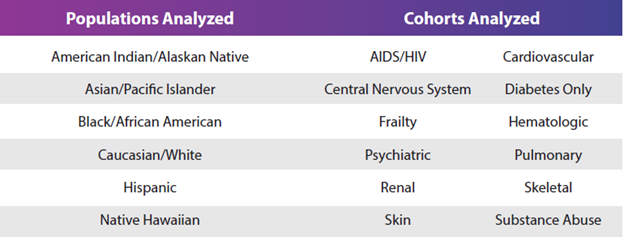
SDOH: the Missing Link in Managing Chronic Conditions
In her last article, our Director of Social Determinants of Health and Product Development Tamara Carlton discussed the role Case Managers play in improving social determinants of health (SDoH) outcomes. This month, she’s diving even further into SDoH and the impact they can have on health outcomes, specifically chronic conditions.
Recent studies have shown that nationwide, healthcare organizations are recognizing the critical role social determinants play in patients’ overall health, including those who have high-risk chronic diseases. In fact, the National Academy of Medicine (NAM) performed a study that looked into the link between social and behavioral factors and the development of chronic conditions. The study supports how important it is for healthcare organizations to offer preventative measures like screenings to identify chronic diseases before they affect a patient’s health.
Chronic Conditions Impacted by SDOH
Social determinants can have an impact on many chronic conditions, including a large umbrella of diseases, disabilities, and more. For example, socioeconomic factors impact conditions such as:
- Cardiovascular disease, also known as heart disease, a condition in which the process of atherosclerosis develops. Plaque build-up takes place in the walls of the arteries, making it harder for blood to flow through. Socioeconomically disadvantaged groups with greater exposure to risk factors like smoking have a higher likelihood of obtaining a condition like cardiovascular disease.
- Type I and II diabetes, long-lasting health conditions that affect how the body turns food in to energy. When the body doesn’t make enough insulin, too much sugar can stay in the bloodstream, leading to serious health problems. According to the Socioeconomic Status Scale (SES), lower levels of income, education, and occupation all have direct correlation to those with diabetes.
- Kidney disease, which occurs when the kidneys are damaged or not developed properly and are unable to filter blood the way they should. The kidneys are then unable perform their main function of filtering extra water and waste out of the blood. For many people, factors that contribute to increased risk for developing this condition include lower socioeconomic status and food insecurities in under-resourced urban and rural communities.
There are a number of additional chronic conditions that are impacted by social and economic determinants. The National Library of Medicine says that “Several studies have found that the social context of a person’s life determines the risk of exposure, degree of susceptibility, and the course and outcome of a disease.” Eliminating health inequalities requires long-term commitment, but can ultimately help decrease rising rates of chronic conditions.
Transportation Drives Positive Results
Transportation is a primary social determinant of health. When someone lacks access to transporation, it makes it challenging to receive the medical care necessary for chronic conditions. By providing non-emergency medical transportation (NEMT), the transportation determinant is removed and access to care for chronic conditions is improved.
To prove the positive impact of NEMT, MTM conducted a case study targeting a high-risk diabetic population. During the study, we reviewed data in three ways: first, by analyzing the diabetic population as a whole and by Type 1 and 2; second, by analyzing secondary cohorts associated; and lastly, by analyzing various populations.
The study concluded that members utilizing the NEMT benefit to receive care had lower long-term cost of care because they had access to transportation to take them to the care necessary to manage their chronic condition.
MTM as the Transportation Solution
Transportation is inexpensive compared to the high and rapidly growing cost of healthcare. MTM continues to be the leading solution for transportation needs that can significantly impact health outcomes, including chronic disease.
By offering NEMT services, health plans can effectively:
- Remove transportation barriers
- Prevent missed medical appointments
- Decrease the impact of chronic disease
- Reduce the costs of inpatient medical treatment
- Save substantial healthcare funding
MTM continues to search for ways to address social determinants of health, paving the path to allow all to attain their highest level of health. Through transportation, MTM is the solution for reducing the impact chronic conditions have on today’s society.
Categories
- Alaina Macia (31)
- Employee Wellness (19)
- ETO Newsletter (64)
- Events (70)
- MTM eNewsletter (83)
- News & Events (655)
- Tradeshows (57)
- Uncategorized (17)
- Webinars (15)




